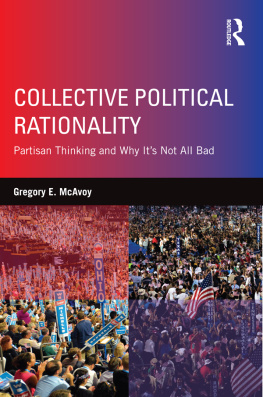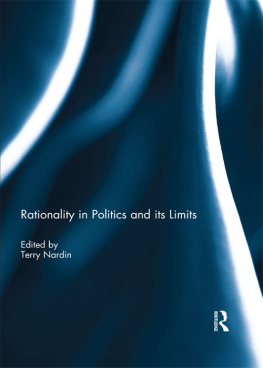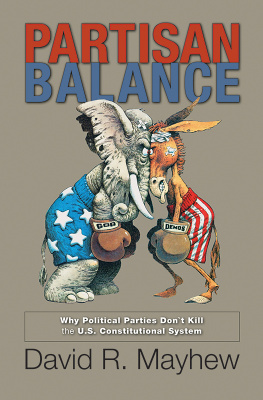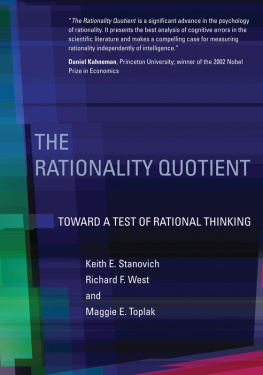Collective Political Rationality
Amidst the polarization of contemporary politics, partisan loyalties among citizens are regarded as one contributor to political stalemate. Partisan loyalties lead Democrats and Republicans to look at the same economic information but to come to strikingly different conclusions about the state of the economy and the performance of the president in managing it. As a result, many observers argue that democratic politics would work better if citizens would shed their party loyalty and more dispassionately assess political and economic news.
In this book, Gregory E. McAvoy argues, contra this conventional wisdom, that partisanship is a necessary feature of modern politics, making it feasible for citizens to make some sense of the vast number of issues that make their way onto the political agenda. Using unique data, he shows that the biases and distortions that partisanship introduces to collective opinion are real, but despite them, collective opinion changes meaningfully in response to economic and political news. In a comparison of the publics assessment of the economy to those of economic experts, he finds a close correspondence between the two over time and argues that in modern democracies an informed public will also necessarily be partisan.
Modernizing the study of collective opinion, McAvoys book is essential reading for scholars of American public opinion and political behavior.
Gregory E. McAvoy is Associate Professor at the University of North Carolina at Greensboro. He has published articles in the fields of public policy, American public opinion, and research methods.
Theoretically rich and full of innovative data, Collective Political Rationality offers a major advance to the study of public opinion. By combining partisanship, political knowledge, issue salience, news, and elections into a single theoretical framework, Gregory McAvoy provides the most comprehensive picture of aggregate opinion ever.
Peter K. Enns, Cornell University
McAvoy provides a stunning advance to the study of the dynamics of public opinion by melding the factors of information, partisanship and salience with the precise components of Bayesian analysis needed for a new path-breaking perspective.
Janet M. Box-Steffensmeier, Ohio State University
The central argument of Gregory McAvoys fine bookthat the partisan loyalties that are often derided in popular commentary and academic writing actually provide the structure that makes collective public opinion sensible and rationalis both theoretically novel, meticulously supported through careful analysis, and, I am convinced, spot on.
Paul Kellstedt, Texas A&M University
First published 2015
by Routledge
711 Third Avenue, New York, NY 10017
and by Routledge
2 Park Square, Milton Park, Abingdon, Oxon, OX14 4RN
Routledge is an imprint of the Taylor & Francis Group, an informa business
2015 Taylor & Francis
The right of Gregory E. McAvoy to be identified as author of this work has been asserted by him in accordance with sections 77 and 78 of the Copyright, Designs and Patents Act 1988.
All rights reserved. No part of this book may be reprinted or reproduced or utilised in any form or by any electronic, mechanical, or other means, now known or hereafter invented, including photocopying and recording, or in any information storage or retrieval system, without permission in writing from the publishers.
Trademark notice: Product or corporate names may be trademarks or registered trademarks, and are used only for identification and explanation without intent to infringe.
Library of Congress Cataloging in Publication Data
McAvoy, Gregory E.
Collective political rationality : partisan thinking and why its not
all bad / Gregory E. McAvoy.
pages cm
Includes bibliographical references and index.
1. Party affiliation United States. 2. Public opinion Political
aspects United States. 3. Political culture United States.
4. Opposition (Political science) United States. 5. Divided
government United States. I. Title.
JK2271.M328 2015
306.260973dc23
2014044984
ISBN: 978-1-138-88512-7 (hbk)
ISBN: 978-1-138-88513-4 (pbk)
ISBN: 978-1-315-71565-0 (ebk)
Typeset in Bembo
by HWA Text and Data Management, London
I began this project wondering about the consequences of this highly partisan era on collective public opinion. Originally I was drawn into the narrative that partisanship was undermining collective opinion. Today the news is filled with stories about the partisan divide. Republicans hate Obamacare; Democrats hate No Child Left Behind. Even stories about issues as seemingly nonpartisan as the flu and controlling the Ebola virus become partisan. The Democrats are to blame for Ebola cases because the White House did not carefully manage the Centers for Disease Control (CDCs) preparedness plans. Republicans are to blame because they cut funding to the CDC. The partisan rhetoric that fills the news filters down to the public, leading Democrats and Republican supporters to view these issues through a partisan lens. As I dug further into the issue of partisanship and collective opinion and gained a better understanding of the way that people rely on partisanship to understand the world, I was particularly struck by research showing that people who are highly informed about politics, the people that are supposed to be making sense of the world, are also some of the most partisan. Slowly it dawned on me that I, as a highly partisan and fairly well-informed citizen, was part of the problem. And not just me, but this profile includes nearly all of my family and friends. (And thanks to social media, I know that it fits most of their friends and family as well.)
Thinking about the thoughtful engaged citizens that I knew led me to explore the issue of partisanship in a new light and to question the standard narrative about the corrosive effects of partisanship. Surely partisanshipso enthusiastically embraced by so manycannot be as bad as many news accounts and some academic literature suggests. Studying this issue further led me back to a reading that I had not looked at since I took a graduate seminar on political parties from Frank Sorauf at the University of Minnesota: the report by an APSA committee from the 1950s, Toward a More Responsible Two Party System (old even when I was in graduate school). The committee was commissioned to address the problem of weak and at times indistinguishable political parties. The committee reported back with an enthusiastic call for strong parties, ones that could send clear partisan signals to their members and enable them to form coherent policy preferences. As others have noted about this report, be careful what you wish for since the parties of today embody at least some of the prescriptions that the commission recommended for a strong party system. Although the analysis of the 1950s does not easily translate to the modern era, the report is refreshing at least in its embrace of party politics.
In this book, I side with the committee in stressing the contribution that parties make to collective opinion. Given the complexity and volume of issues that make it onto the political agenda, it seems naive to think that ordinary citizens could make sense of modern politics without relying on party cues. Obviously, partisanship can be taken to an extreme and we may at times have bumped up against those extremes in the modern era, but that does not negate the need for and value of parties in making sense of the world. I think that the contribution that parties make to public opinion described in this book are real and meaningful, and that the analysis is not an extended rationalization of my own partisanship. But, I will leave that for the reader to judge.












